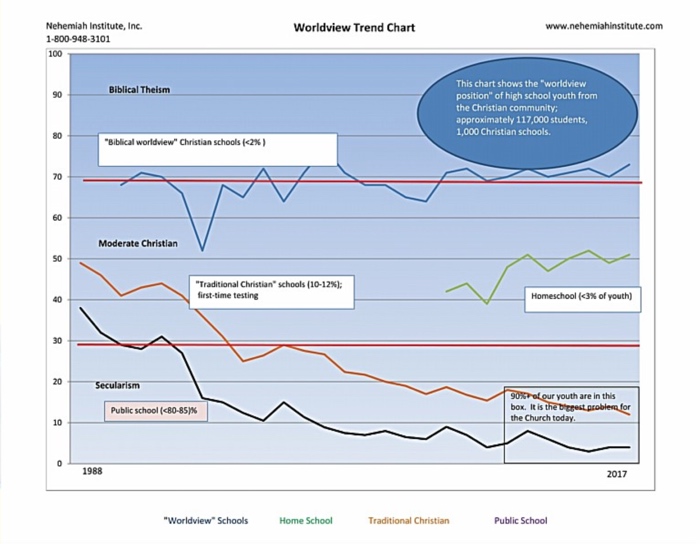Christ’s lordship is manifest in every area of study, with application to all subjects.
Bible Classes & Chapel
CONVENTIONAL: Bible classes and chapel at conventional Christian schools provide a spiritual aspect to an otherwise progressive approach to education. Much of “Christianity” is set apart because the progressive model implicitly believes education has two parts: religious and secular. Academic accreditation, books, teacher training, and other systems shared with public schools ensure that they bypass other opportunities for Christian integration. This inadvertent practice results in a divided view, not a Christian worldview.
What you might see: Students often lead worship at a weekly or daily chapel, have Bible classes, and learn from Christian texts that have content consistent with the state core. Teachers pray before or after class and disciple students.
- Emphasis: Bible teaching and spirituality are important, but separated from other subjects. Even Christian textbook authors mimic the progressive school approach and method. For example, they occasionally add a “spiritual” box at the end of an otherwise secular chapter.
- Sources: The accreditation, teacher certification, and publishing industries interconnect throughout conventional K-12 education. The result–a latent separation of useful, vocational education and Christian truth.
- Bible study takes place in a context of the moral and spiritual, while other subjects are seen as neutral, or disconnected. For example, In US government, students may talk about the Christianity of our founding fathers, but they are unlikely to debate the Christian basis for Locke or Jefferson’s philosophical ideas.
Bottom Line: Students develop a solid knowledge of Scripture, but they lack the experience to apply it in historical or existential ways. This limits their Christian worldview application. When students are met with the challenges of modern ideologies, they will react as they have learned, by compartmentalizing their faith in relation to other fields of knowledge. This will make it less and less relevant to the daily exercise of living and thinking as a Christian in a post-Christian world. In spite of this crucial ideological difference, many conventional Christian schools have thriving Christian communities in which Truth and righteous faith are pursued in earnest. Classicists do not mean to diminish this good work of conventional Christian schools, but rather encourage parents to consider teaching their children to seek and apply truth in the integrated fashion that classical Christian education alone offers.
Biblical Worldview Integration
Classical Christian education (CCE) holds that the truth of Christ’s lordship is manifest in every area of study, academic and personal alike. Classicists maintain that God is the beginning and the end of everything we can know. Everything has unity in exactly one point—it was and is created and sustained by Jesus Christ. CCE integrates subjects under this premise.
What you might see: Students are asking “why” to a variety of deep theological questions. Students are asked to wrestle with these why’s under the guidance of a teacher through Socratic discussion. Each primary work read is understood through a parallel reading of scripture. The school culture is community oriented, with music and worship tied to older, traditional sources.
- Emphasis: We recognize that subjects are merely categories that educators impose for practical reasons. You may see devoted Bible time, or devotions within our schools. But, you’ll more frequently see biblical engagement with every subject and topic.
- Sources: We use fewer “textbooks” that reflect the modern tendency to break knowledge into categories (sacred/secular). When we do use textbooks, the majority of our curricula is built by classical educators using classical methods and theory.
- The Bible is the foremost tool for understanding any point of theology and philosophy. Since our entire core is philosophy based, the Bible formally becomes part of the entire curriculum.
- Our teachers are typically trained outside of the conventional educational certification system.
- ACCS accreditation is independent of conventional school accreditation. This level of independence helps us reorient everything we do toward Christ.
Bottom Line: Students see every inch of thought, history, and natural creation as an extension of the work of Jesus Christ. This practice equips students to wisely navigate life’s ethical and spiritual challenges that they will inevitably face. Students learn to, as Paul wrote in Corinthians, “to take every thought captive to Christ,” meaning that they recognize the permanent and beautiful truth of redemption, in spite of what political propaganda, enticing opportunities, and cultural rhetoric they may encounter.
The Results:
When you reference the Nehemiah chart below, classical Christian students are the only students who have maintained a Christian worldview despite massive social and cultural change.
Nehemiah Institute Worldview Trends

